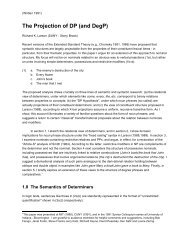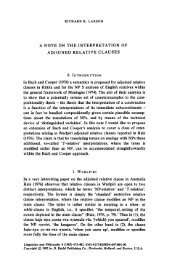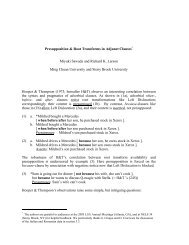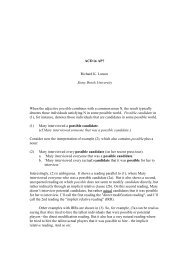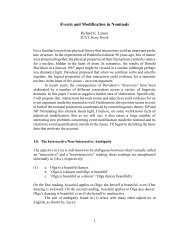Intensional Transitive Verbs and Abstract Clausal Complementation
Intensional Transitive Verbs and Abstract Clausal Complementation
Intensional Transitive Verbs and Abstract Clausal Complementation
Create successful ePaper yourself
Turn your PDF publications into a flip-book with our unique Google optimized e-Paper software.
<strong>Intensional</strong> <strong>Transitive</strong> <strong>Verbs</strong> <strong>and</strong> <strong>Abstract</strong> <strong>Clausal</strong> <strong>Complementation</strong><br />
second underst<strong>and</strong>ing, (95a) might be true in both the situations given above. Whether in the ocean or<br />
within a glass tank, sharks make Max fearful. Notice that in precisely this case we would be inclined to<br />
talk about Max having a shark-phobia. Interestingly, complements of phobia appear to be transparent in<br />
the usual sense. Thus consider a phobia on Max’s part to hazelnuts. It seems to us that if (96a) is true,<br />
then (96b) must be true as well, given the coextension of hazelnut <strong>and</strong> filbert; similarly for (97a,b):<br />
(96) a. Max has a phobia about hazelnuts.<br />
b. Max has a phobia about filberts.<br />
(97) a. Max has a phobia about Boris Karloff.<br />
b. Max has a phobia about William Henry Pratt.<br />
The issue of nondenoting terms is a bit less clear however. While it is obvious that a child can fear<br />
gremlins or hobgoblins, in the sense of fearing that they might be hiding under their bed or in a closet, it is<br />
much less clear that one can have a gremlin or goblin phobia. It is not clear how goblins can be the<br />
occasion of fear on the part of an individual when no such creatures exist. On the basis of these<br />
considerations, the prospects for an example like (98) being true seem to us at best very unclear:<br />
(98) Max has a phobia about goblins.<br />
Thus, although we will not attempt to pursue the issue further, it appears to us that, when divided properly<br />
into their propositional <strong>and</strong> nonpropositional senses, a concealed clause analysis of emotion verbs like<br />
fear, like, frighten <strong>and</strong> please is available in principle. 43<br />
A rather different challenge is presented by verbs of veneration, including worship, revere,<br />
venerate, adore, etc. (99):<br />
(99) a. Sophocles worshipped Zeus.<br />
b. Native Australians venerate the Great Rock Python.<br />
While these examples have some of the marks of intensionality (one can judge (99a,b) to be true without<br />
believing in Olympian gods or figures of Australian dreaming), Montague (among others) took these to be<br />
abberant cases. The puzzle presented by these verbs is that while one can truthfully be said to worship<br />
nonexistent objects like Zeus, it is not so obvious that substitution fails in these contexts. For example, if<br />
one worships Zeus is one not thereby worshiping Jupiter? (One is reminded of the Apostle Paul<br />
preaching at the temple of the unknown god, arguing that they had been worshiping his God all along.)<br />
Our intuitions on these cases are far from clear.<br />
43 Psychological predicates such as frighten <strong>and</strong> irritate show intensionality effects in their subject position. This<br />
result appears to support the general proposal by Belletti <strong>and</strong> Rizzi (1988) that the subjects of "psych" verbs of this<br />
class are moved to the subject position from a within the VP. On our approach the latter must be located within<br />
some form of clausal complement:<br />
(i) [Sharks] are [ VP frightening Bill [ ...t ...] ]<br />
We will not attempt to spell out the details of this analysis further at this point.<br />
37



